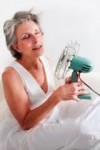 Recently, I attended the meeting of the North American Menopause Society (NAMS) in Washington DC along with 1500 other health professionals. The bottom line: Estrogen is not the devil, but it is not the panacea for all things female!
Recently, I attended the meeting of the North American Menopause Society (NAMS) in Washington DC along with 1500 other health professionals. The bottom line: Estrogen is not the devil, but it is not the panacea for all things female!
When the large Women's Health Initiative was halted in 2002 due to some unexpected findings in women on hormone treatment, the use of hormones significantly dropped. However, many women found that their most bothersome symptoms returned and some went back on HT with a bit more concern.
The conference focused on new data, much of it refined to look at subsets of women. It has become significantly clearer that all women are NOT alike when it comes to their health status at the time menopause begins, their age at onset, and the intensity of symptoms. Thus, generalizing outcomes to all women makes little sense.
Here are a few key points that were discussed at the meeting and are currently being studied by researchers:
- Ill effects in the WHI participants were more predominant in women who were 10 years post menopause when it came to heart disease. The latest research suggests that estrogen can make atherosclerosis (one cause of heart disease) worse in women who already have it, but it may delay or prevent it in women who still have healthy arteries.
- There is an increased risk of breast cancer in hormone users but the absolute numbers were small and were more prevalent among those who took HR that contained both estrogen and progesterone. Women on estrogen alone had risks similar to placebo. There is growing interest in the role certain types of progesterone used in combination therapy play in breast cancer risk.
- There is a major concern about osteoporosis and bone fractures among aging women whose estrogen levels are dropping. As one researcher put it, "breaking a hip (in older women) can kill you faster than breast cancer". Approximately 50% of women over age 50 will have at least one fracture and we know that hormone therapy significantly reduces that risk. Understanding personal risk profiles for these two conditions should be part of the decision process.
- While there are more drugs on the market to help maintain bone health, there is more long term data available on their use that is indicating some alarming side effects with prolonged use. Some of these side effects may be worse than those related to hormone therapy.
- Researchers are finding that the stages of the menopause transition are quite complex and there may be several levels of the transition that may need different interventions.
- Vaginal atrophy in women including breast cancer survivors can be devastating and reasonable treatment options are sorely needed.
- Since the WHI, there are new treatment options available today for menopause symptoms using different drug formulas and different means of applications (pills, patches, creams, gels and sprays) that may have reduced risk profiles.
That's just a sampling of the many topics discussed at this conference. Our Institute has been awarded a grant from the Evergreen Initiative at Northwestern Memorial Hospital Foundation to create a decision making tool for women who are menopausal and having bothersome symptoms. As a result, we will be focusing on all aspects of menopause this year through our educational and fact finding events and I encourage you to follow our blog for our latest findings.

 Soy supplements do not help women in menopause, according to the findings of a two-year, $3 million study conducted at the Miller School of Medicine’s Osteoporosis Center. The study was funded by the National Institutes of Health to determine if the widely popular product could preserve bone health and ease symptoms in the first years of menopause. The results show that, contrary to popular belief, soy isoflavone supplements neither prevent bone loss nor reduce menopausal symptoms.
Soy supplements do not help women in menopause, according to the findings of a two-year, $3 million study conducted at the Miller School of Medicine’s Osteoporosis Center. The study was funded by the National Institutes of Health to determine if the widely popular product could preserve bone health and ease symptoms in the first years of menopause. The results show that, contrary to popular belief, soy isoflavone supplements neither prevent bone loss nor reduce menopausal symptoms. Flaxseed provides no benefit in easing
Flaxseed provides no benefit in easing 
 The results of the first study to examine the relationship between menopausal symptoms and breast cancer risk are available online ahead of the February print issue of
The results of the first study to examine the relationship between menopausal symptoms and breast cancer risk are available online ahead of the February print issue of  Study finds women who suffer from hot flashes when they begin menopause are at lower risk for cardiovascular events
Study finds women who suffer from hot flashes when they begin menopause are at lower risk for cardiovascular events  Women taking a low dose of the antidepressant escitalopram had fewer and less severe hot flashes than those taking a placebo, a new clinical trial reports.
Women taking a low dose of the antidepressant escitalopram had fewer and less severe hot flashes than those taking a placebo, a new clinical trial reports. Due to the blizzard expected in Chicago today, Hot Flash Havoc ---a film of menopausal proportions, will be rescheduled at Northwestern University and be shown on Thursday night, February 3. The award winning film will be followed by a panel of experts from Northwestern who will be available to answer all your questions about menopause. To register for the event, click
Due to the blizzard expected in Chicago today, Hot Flash Havoc ---a film of menopausal proportions, will be rescheduled at Northwestern University and be shown on Thursday night, February 3. The award winning film will be followed by a panel of experts from Northwestern who will be available to answer all your questions about menopause. To register for the event, click A recent Food and Drug Administration (FDA) MedWatch Safety Alert warns women to make sure children and pets do not come into contact with Evamist that they have sprayed on their skin. Evamist is a transdermal spray containing estradiol, a form of estrogen. It is sprayed inside of the forearm between the elbow and wrist to reduce hot flashes during menopause. Each squirt of spray delivers 90 mcL which contains 1.53 mg of estradiol and is FDA approved for this use.
A recent Food and Drug Administration (FDA) MedWatch Safety Alert warns women to make sure children and pets do not come into contact with Evamist that they have sprayed on their skin. Evamist is a transdermal spray containing estradiol, a form of estrogen. It is sprayed inside of the forearm between the elbow and wrist to reduce hot flashes during menopause. Each squirt of spray delivers 90 mcL which contains 1.53 mg of estradiol and is FDA approved for this use.